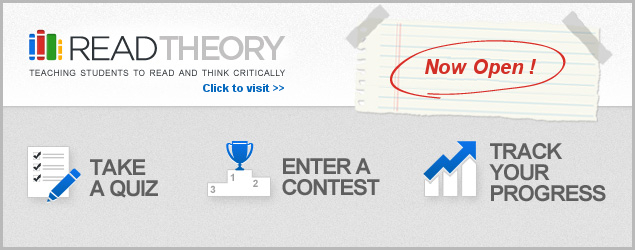
"Your reading comprehension materials are the best I've found on the web. They are so thorough and comprehensive! My students and I have learned a lot from them. Thanks so much!" -- Susan B., Carter, KY. 03/21/12
Like these materials? Show your support by liking us on Facebook.
On this page you will find our complete list of high quality reading comprehension worksheets created specially by our team for students in grade levels K-12. Our worksheets elicit the use of critical thinking skills at every level. While some questions ask the reader to peruse the passage for particular details, most questions involve the use of deductive reasoning, conclusion making, logical inference, sequential analysis, tonal awareness, and an understanding of scope. These materials are highly effective in supplementing the education of verbal reasoning and critical thinking skills on behalf of the reader. What is more, these materials are applicable for students of all ages and ability levels. Many of the resources found on this page are available in online quiz form at our sister site, ReadTheory.
If there were only one aspect of language that students could study (or that educators could teach), it would invariably be reading comprehension. Beloved reading comprehension, a friend to nearly every teacher of language. But what makes it so special? Why is it so revered by both students and teachers alike? To answer these questions, it helps to know just what reading comprehension is. Reading comprehension is defined as the level of understanding of a text. This understanding comes from the interaction between the words that are written and how they trigger knowledge outside the text. Humans are thought to have a set reserve, an established threshold for attention and absorption of information, commonly referred to as processing capacity. This being the case, it is generally believed that proficient reading depends on the ability to recognize words quickly and effortlessly. If word recognition is difficult, students use too much of their processing capacity to read individual words, which interferes with their ability to comprehend what is read. Many educators in the United States believe that students need to learn to analyze text (comprehend it) even before they can read it on their own, and comprehension instruction generally begins in pre-Kindergarten or Kindergarten. But other US educators consider this reading approach to be completely backward for very young children, arguing that the children must learn how to decode the words in a story through phonics before they can analyze the story itself. The reason why reading comprehension is such an effective learning tool is that, like art, it teaches students to manipulate particulars in attempt to represent the universal. When a student reads a text, he or she is forced to absorb a great deal of particular facts concerning an infinitude of seemingly random subjects (volcanoes, molecules, skateboarding, etc.) and assimilate them into the bigger picture, establishing just how they fit in, or relate, to the broader world. Mathematics, the diametrical opposite of art, challenges students in an inverse way; it teaches them to manipulate universals in order to represent the particular. No matter what the number "3" may come to stand for - volcanoes or molecules or skateboards - the student will be able to manipulate these things given his or her understanding of math. Based on this understanding, one might actually say that reading comprehension shares a unique association with art and math, each providing a way of understanding the world from a fundamental, yet polar, perspective.
READ THEORY
Workbooks Visit our online store here!
Our reading comprehension worksheets teach students to think critically, draw inferences, understand scope and global concepts, find or recall details, and infer the meaning of useful vocabulary words.
© COPYRIGHT NOTICE: The below publications contain copyrighted work to be used by teachers in school or at home. Binding, bookmaking, and or collation, reproduction and or duplication on other websites, creation of online quizzes or tests, saving to disks or hard drives, publication on intranets such as Moodle and Blackboard, and or use of our worksheets for commercial gain is strictly prohibited.
Phew! Thinking critically is tiring! Well, we hope you found the things you needed. Just remember to uphold our Terms of Use when using them. Oh yeah, and don't forget that these materials are samples taken from our sister site, ReadTheory -- an interactive website dedicated to improving reading comprehension for all ages and ability levels. We think it's pretty awesome. Click on the link to check it out!

You really really like reading comprehension. We get it. That's why we created Read Theory, a website that offers over 1000 reading comprehension quizzes and automatically adapts to student reading ability. Pretty amazing, right? On Read Theory, students can take quizzes, enter contests, create avatars, earn points and achievements, and more. Teachers can create virtual classes and track their students' performance using graphs, charts, and percentages. See. amazing. But don't take it from us. See for yourself. Click the banner below!
In this series, readers are tested on their ability to perform interpretations, make deductions, and infer the meaning of vocabulary words based on an informational passage.
© COPYRIGHT NOTICE: The below publications contain copyrighted work to be used by teachers in school or at home. Binding, bookmaking, and or collation, reproduction and or duplication on other websites, creation of online quizzes or tests, saving to disks or hard drives, publication on intranets such as Moodle and Blackboard, and or use of our worksheets for commercial gain is strictly prohibited.